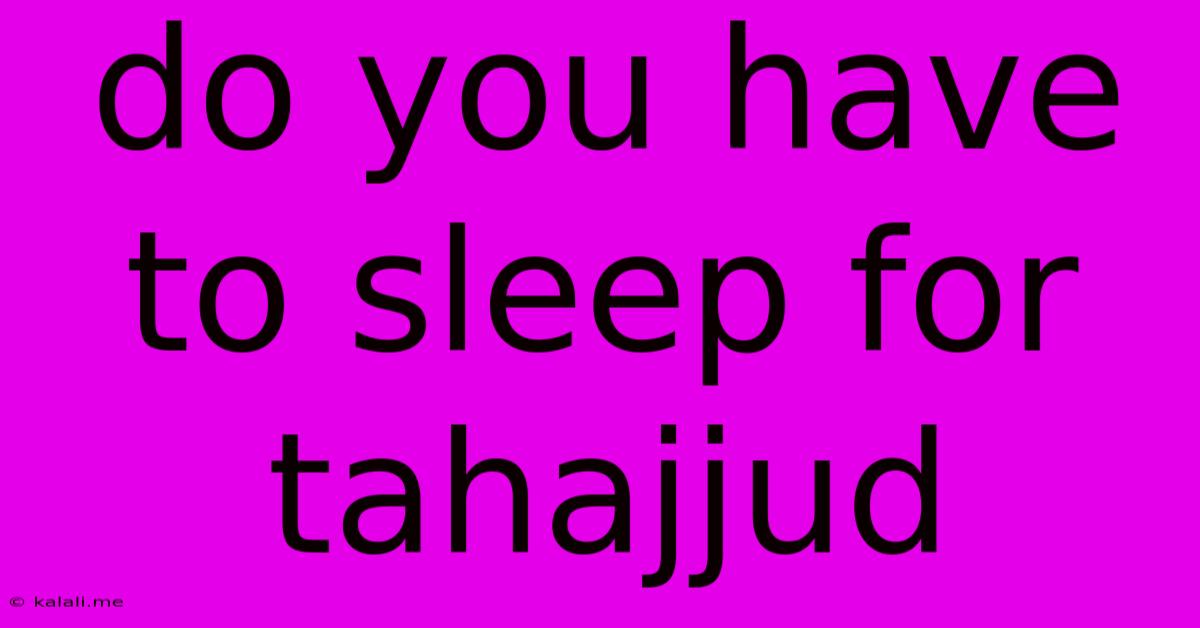Do You Have To Sleep For Tahajjud
Kalali
May 21, 2025 · 3 min read

Table of Contents
Do You Have to Sleep to Pray Tahajjud?
Is sleeping a prerequisite for praying Tahajjud? This is a common question among Muslims seeking to understand the nuances of this highly rewarding night prayer. The short answer is: no, you don't have to sleep to pray Tahajjud. However, the understanding of when and how to pray Tahajjud is crucial. This article will delve into the details, clarifying misconceptions and offering a deeper understanding of this spiritual practice.
This article will explore the Islamic perspective on Tahajjud prayer, examining the significance of sleeping, the recommended times, and the overall spirit behind this act of devotion. We'll address frequently asked questions surrounding sleep and Tahajjud, providing clarity and guidance for those seeking to incorporate this prayer into their daily lives.
Understanding Tahajjud: A Night of Devotion
Tahajjud, also known as salat al-layl (night prayer), is a voluntary prayer performed after Isha and before Fajr. It's a highly recommended act of worship, carrying immense spiritual rewards. The Prophet Muhammad (peace be upon him) highly encouraged it, emphasizing its virtue and closeness to Allah. The key here is the voluntary aspect; it's not obligatory like the five daily prayers. Its merit lies in the sincerity and devotion of the worshipper.
The specific time for Tahajjud prayer is flexible, falling within the late hours of the night. Some scholars highlight the last third of the night as particularly blessed for this prayer. This allows for personal flexibility, based on individual circumstances and schedules.
The Role of Sleep in Tahajjud Prayer
While sleeping isn't a requirement for performing Tahajjud, it's often associated with it. The Prophet Muhammad (peace be upon him) frequently performed Tahajjud after waking from sleep. This practice underscores the importance of waking up during the night for prayer, showcasing dedication and commitment to Allah.
However, the emphasis is on the act of prayer itself, not the act of sleeping beforehand. If one is unable to sleep, but still wakes up in the latter part of the night with the intention to pray Tahajjud, then the prayer remains valid and rewarding. The intention and devotion are paramount.
Benefits of Praying Tahajjud After Sleeping
While not mandatory, sleeping before Tahajjud offers several potential benefits:
- Increased Spiritual Awareness: Sleep can help clear the mind, allowing for a more focused and spiritually enriched prayer experience.
- Physical and Mental Rest: Adequate sleep ensures better concentration and enhances the overall quality of prayer.
- Following the Sunnah: The Prophet's practice of praying Tahajjud after waking from sleep serves as a commendable example.
Praying Tahajjud Without Sleeping: Still Valid
It's equally valid and commendable to perform Tahajjud without sleeping. One might find themselves awake later at night due to various reasons and could decide to perform Tahajjud. This sincere act of worship, regardless of whether it follows a period of sleep, remains accepted and highly rewarded by Allah. The intention and devotion are the core elements.
In Conclusion
The essence of Tahajjud lies in the devotion and connection with Allah. While the Prophet's practice often involved waking up from sleep to perform Tahajjud, sleeping is not a prerequisite. Whether you pray Tahajjud after a period of sleep or directly after Isha, the important factor is the sincerity of your intention and the dedication to this act of worship. The reward is based on the devotion, not the preceding sleep. So, prioritize the prayer itself, and let your intention guide you.
Latest Posts
Latest Posts
-
Which Terminal Connect First Car Battery
May 21, 2025
-
Why Did Jesus Turn Water Into Wine
May 21, 2025
-
What Is Com In Light Switch
May 21, 2025
-
How To Find Missions Gta 5
May 21, 2025
-
Error For Site Owner Invalid Key Type
May 21, 2025
Related Post
Thank you for visiting our website which covers about Do You Have To Sleep For Tahajjud . We hope the information provided has been useful to you. Feel free to contact us if you have any questions or need further assistance. See you next time and don't miss to bookmark.